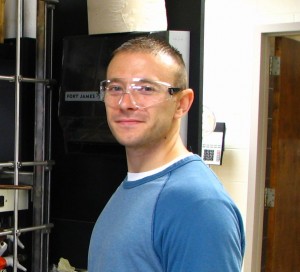Associate Professor of Chemistry
Office: Main Hall MB54Phone: (304) 336-8890E-Mail: douglas.swartz@westliberty.edu Address:West Liberty University
208 University Drive, College Union Box 160
West Liberty, WV 26074
Bio:
Dr. Swartz was born, raised, and educated in the great state of Michigan. He holds a B.S. in chemistry from Madonna University
and Ph.D. from Michigan State University. As an undergraduate, he worked on summer research projects under the direction of Aaron Odom, Michigan State University, and John T. Groves, Princeton University. Dr. Swartz returned to Michigan State University upon receiving his bachelor’s degree and continued to worked under the guidance of Aaron Odom working on titanium catalyzed hydroamination catalyst design and development using pyrrolyl based ligands.
During graduate school, Dr. Swartz took a leave of absence to work at Los Alamos National Laboratory with James Boncella to investigate the synthesis and reactivity of uranium complexes ligated with pyrrolyl based
ancillaries. Dr. Swartz completed his Ph.D. in 2009 and accepted an assistant professorship at Kutztown University that same year. Dr. Swartz joined the West Liberty University faculty in 2012.
Currently, Dr. Swartz is an Associate Professor of Chemistry. Dr. Swartz resides near West Liberty, WV with his wife and three children.
Research:
Projects with Dr. Swartz include everything related to water, from contaminate detection and quantification to scale control in oilfield applications. Research projects include the following:
Hydraulic Fracturing Scale Control
Since hydraulic fracturing was first demonstrated in the 1940s, this methodology has progressed in its efficacy and efficiency to provide a valuable natural fuel source to consumers, however this methodology to extract these resources are not without their obstacles and dilemmas. The hydraulic facturing flowback solutions (fracking solution that returns to the surface via the well bore) contain high levels of dissolved mineral solids that are leached from the geological bedrock formation. The flowback water is an overly saturated solution with extremely high concentrations of cations and anions. This over saturation of calcium, barium, strontium, and iron is likely to deposit scales in the form of sulfates, hydroxides, and carbonates.
The aim of this project is to prepare novel chemical scale inhibitors and formulations utilizing more carboxylate, alcohol, amine functionalities in conjunction with phosphonates to reduce the phosphorus signature with excellent scale inhibition. We investigate the incorporation of these small molecules with biodegradable lactic acid co-polymers to use as scale inhibitors that allows for lower chemical feed quantity and rates and ultimately provide a cost effect solution in oil and natural gas production.
Interests and Hobbies:
Dr. Swartz is a die-hard basketball fan and can be found frequently on the courts surrounding campus when he isn’t in the classroom or laboratory. His basketball shoe collection continues to grow almost monthly with new editions of retro Jordan’s and signature shoes from influential basketball players from the 1990s and early 2000s. Aside from basketball, Dr. Swartz enjoys fishing, golfing, and bowling.
Courses Taught:
- Inorganic Chemistry
- Analytical Chemistry
- Instrumental Analysis
- Organometallic Chemistry
In the News:
Research on Natural Waters
https://westliberty.edu/news/news/students-conduct-research-on-natural-waters/
Scale Control Grant
https://westliberty.edu/news/news/60000-awarded-university-industry-research/
The Real Side of Dr. Swartz
A Day in the Life of a Chemistry Major
